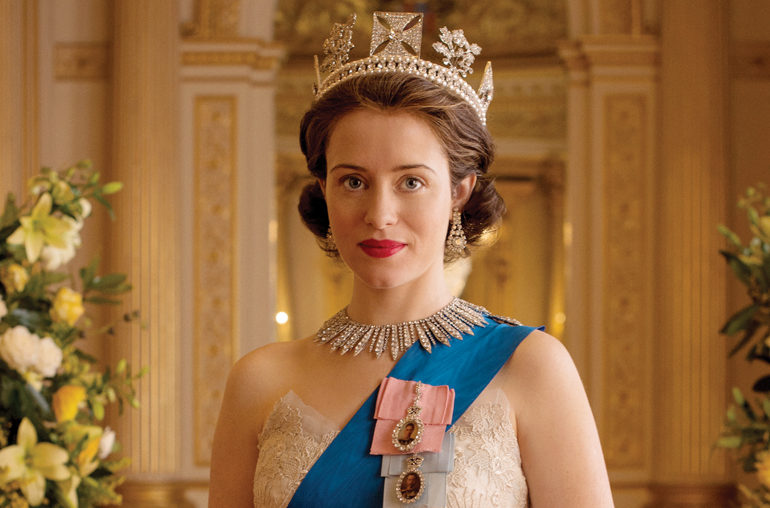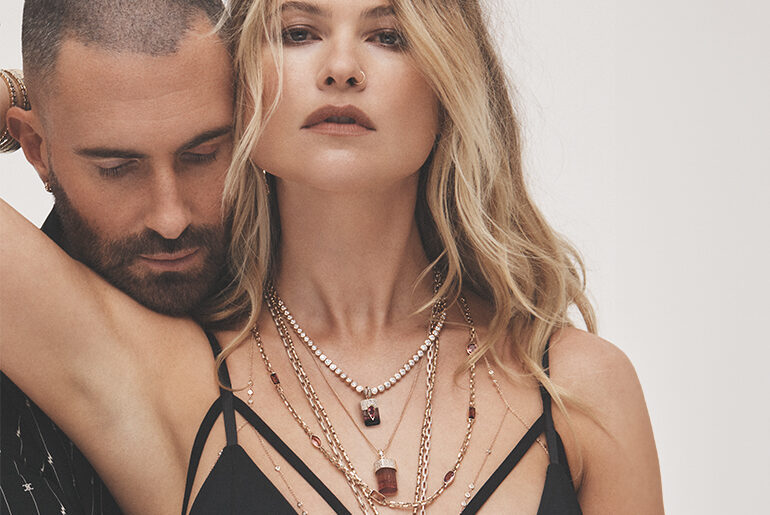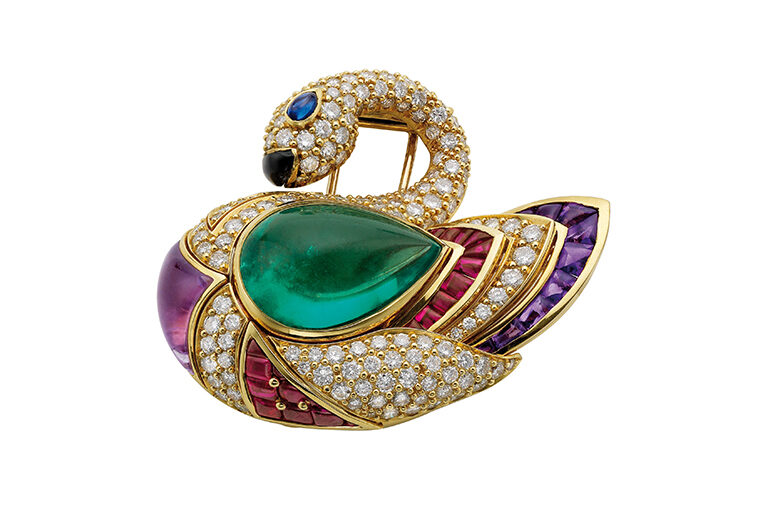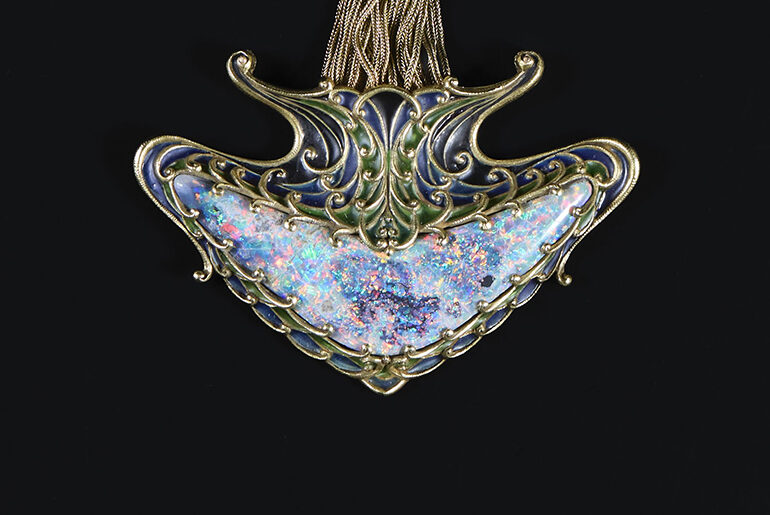The historic royal jewels portrayed in Netflix drama The Crown are the subject of an exhibit on the show’s costumes.
Set against a backdrop of dramatic world events and pivotal private moments, the first two seasons of the popular Netflix original series The Crown follows the journey of Princess Elizabeth as she assumes the mantle of queen. The elaborate costumes play a major part in setting the stage for the story, and the accompanying jewels lend it glitteringly realistic detail. With a third season scheduled to come out later this year, 40 of the show’s costumes and the royal-jewelry replicas that go with them are on display at the Winterthur Museum, Garden & Library — the former home of collector Henry Francis du Pont in Winterthur, Delaware.
Titled “Costuming The Crown,” the exhibition highlights the work of Michele Clapton and Jane Petrie, the series’ costume designers for seasons one and two, respectively. “Essentially, the exhibition focuses on the work of the designers in helping to create this story and the characters themselves. So much of it is about getting history right,” says Winterthur exhibitions manager Kim Collison, who co-curated the event along with Linda Eaton, director of collections, and estate historian Jeff Groff.
There are four sections in the exhibition, continues Collison: “Establishing Roles,” which deals with Queen Elizabeth II’s coronation; “Dressing the Part,” showing how the series’ costumes replicate historical ones; “Creating Character,”which focuses on fictionalized private moments; and “Capturing the Image,” a look at the royal family in iconic moments from official portraiture and televised events.

Image: Winterthur Museum, Garden & Library.
Setting the stage
Tiaras account for much of the jewelry on display, which also includes replicas of Elizabeth’s diamond, ruby and sapphire coronation ring and other coronation regalia. While these iconic jewels help enhance the historical aspects, other pieces further the development of the characters in the fictionalized scenes. By using brooches and simple pearl necklaces the characters might have worn at the time, the designers add another layer of believability, says the co-curator.
One real-to-reel moment where jewelry helps authenticate the costume is a scene showing Queen Mary at home. “She’s wearing a beaded dress in the Edwardian style she was known to wear, adorned with a replica of the diamond bow and heart diamond brooch given to her in 1893 as a wedding gift from her husband, the Duke of York,” says Collison.
The exhibition also shows clips featuring particular costumes. “One of my favorites is a fictionalized scene where Princess Margaret is selecting a tiara to wear when she is to speak to ambassadors,” says Collison. Margaret pushes the limits of her place in the royal hierarchy by choosing the Cambridge Lover’s Knot Tiara. “These fictionalized moments emphasize the narrative of Margaret’s jealousy of Elizabeth’s role,” Collison explains.

Pomp and circumstance
The show’s reenactment of Elizabeth’s 1953 coronation glows with jeweled accents, particularly the three historically significant crowns she wears. Two of them are part of the exhibition: St. Edward’s Crown and the George IV Diadem. The former, which dates to 1661, was made for the coronation of Charles II and is the one used exclusively to crown a monarch. The latter is the one Elizabeth wore on the procession into Westminster Abbey. The third, which does not appear in the exhibit, is the Imperial State Crown, which the queen wore out of Westminster Abbey.
Also represented is the Cullinan diamond, which was found in South Africa in 1905 and features in several of the crown jewels. King Edward VII received it as a gift from the government of the Transvaal Colony. “The largest rough diamond ever mined, it was cut into several stones,” recounts Collison. “The Cullinan I is part of the sovereign’s scepter, a replica of which is shown. The Cullinan III and IV were turned into a brooch that was often worn by Queen Mary, including on the marriages of all her children and at Princess Elizabeth’s wedding. On the latter occasion, Queen Mary, known for wearing layers of jewelry, is shown wearing pearls and other diamonds, including an Order of the Garter star.”
Collison hopes “that visitors to the exhibition can see and understand the role costume design played in not only telling a story, but in bringing history to life.”

Image: Winterthur Museum, Garden & Library.
A TIME FOR TIARAS
Tiaras — glittery, semicircular headpieces that the queen and other married women would wear for formal occasions — are a key part of the royal family’s costumes in The Crown.
Differing from an actual crown, which is a full circle, many of the tiaras in the “Costuming The Crown” exhibit have a built-in versatility, according to co-curator Kim Collison. “These tiaras came apart to become necklaces and brooches.”
One such is the classic King George III Fringe Tiara that then-Princess Elizabeth (now Queen Elizabeth II) wore at her wedding; it can turn into a necklace. It was actually her “something borrowed,” since it belonged to her mother at the time, says Collison. Elizabeth later loaned it to her own daughter, Princess Anne, for her wedding day.
Another convertible tiara with a rich history, Queen Alexandra’s Kokoshnik Tiara, was a gift from Queen Alexandra to Queen Mary, who gifted it to Elizabeth. Queen Elizabeth has the largest collection of tiaras in the world, many of which she inherited, notes Collison. “Included is the Cambridge Lover’s Knot Tiara, which was a favorite of Princess Diana and one that we see Kate Middleton wear today.”
Like most of the jewelry in the exhibition, the tiaras were created by Juliette Designs, Collison says. “The firm specializes in recreating royal jewelry using base metals, Swarovski crystals and cubic zirconia, based on detailed descriptions in a book issued by [UK government publisher] The Stationery Office.”
Main image: Actress Claire Foy portraying the young Queen Elizabeth II, wearing replicas of the George IV diadem and Order of the Garter insignia. Image: Alex Bailey/Netflix.





Comments are closed.